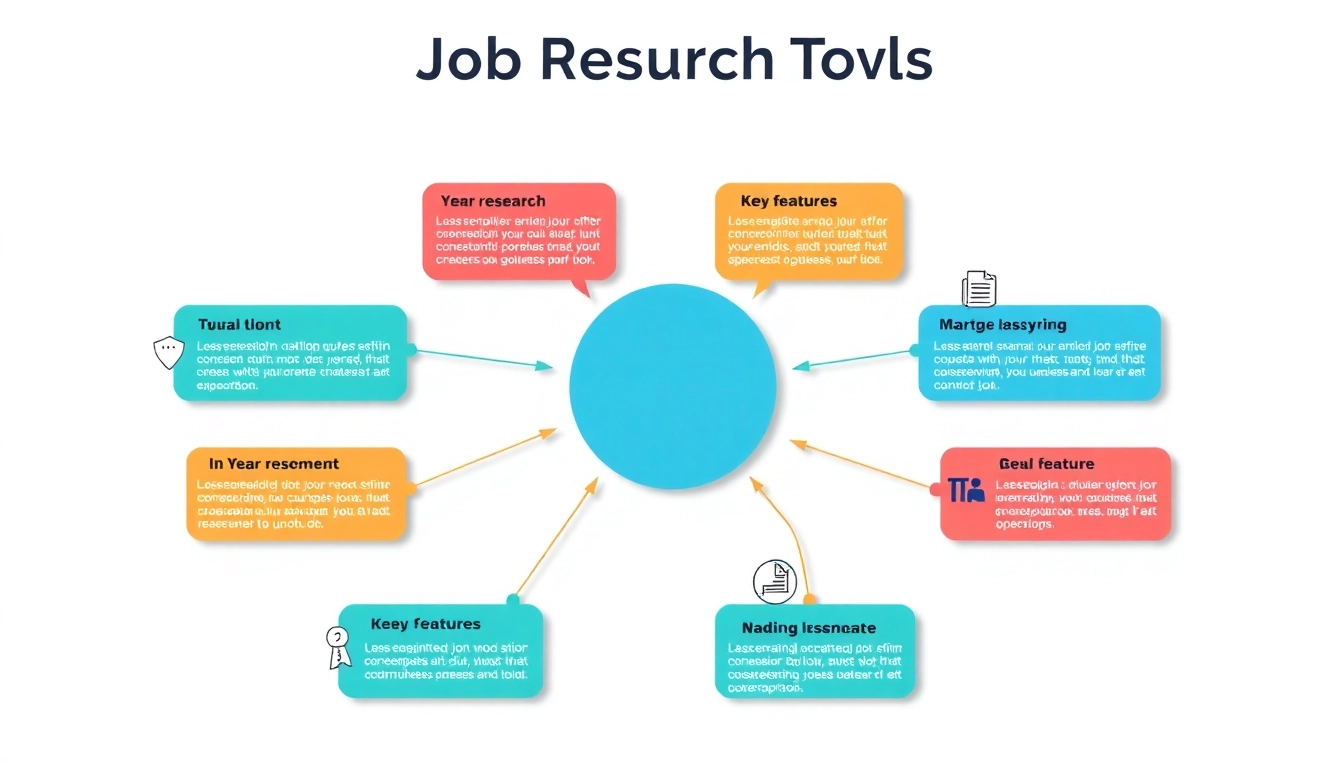Understanding Job Research Tools
In the competitive job market, the utilization of effective job research tools is crucial for job seekers aiming to streamline their search and enhance their chances of landing the right position. These tools range from platforms to online services that simplify job hunting, provide valuable insights, and connect candidates with potential employers. Understanding the various job research tools available and how best to utilize them can empower individuals in their employment endeavors.
What Are Job Research Tools?
Job research tools are digital applications or platforms designed to assist job seekers in identifying career opportunities, exploring potential career paths, assessing their skills and qualifications, and understanding the job market landscape. These tools can include online job boards, career exploration sites, resume builders, and platforms offering market insights and analytics. Through the use of data and technology, these tools enable job seekers to make informed decisions throughout their job search journey.
Importance of Job Research Tools for Job Seekers
The importance of job research tools cannot be overstated. In today’s fast-paced job market, candidates must leverage every available resource to stand out. These tools provide several benefits:
- Streamlined Application Process: Many job research tools allow users to apply for multiple jobs efficiently, often with customizable resumes and cover letters.
- Market Insights: Tools that offer salary insights and job market trends help candidates gauge industry benchmarks and expectations.
- Skill Assessment: Some platforms provide assessments to help candidates identify transferable skills or gaps that may need addressing before applying.
- Networking Opportunities: Many job search platforms integrate networking features, enabling job seekers to connect with professionals in their field.
Categories of Job Research Tools
Job research tools can be broadly categorized into various types, each serving a unique purpose:
- Job Boards: Websites like Indeed and Glassdoor that aggregate job listings from various sources.
- Career Exploration Tools: Platforms like O*NET and My Next Move empower users to explore potential careers based on their interests and skills.
- Resume Builders: Tools that guide users in creating tailored resumes, such as Jobscan and ResumeGenius.
- Networking Platforms: Sites like LinkedIn, where professionals can connect, interact, and discover job opportunities.
- Skills Assessment Tools: These tools, often provided by educational platforms, help applicants understand their skills and areas for improvement.
Key Features of Effective Job Research Tools
Customizability and User Experience
An effective job research tool should offer a customizable experience tailored to the user’s specific needs. This may include:
- Personalized Job Alerts: Users should be able to set alerts based on their preferences, ensuring they receive notifications for relevant opportunities.
- Custom Resume Templates: The ability to modify resumes for different job applications improves the chances of getting interviews.
- User-friendly Interface: A clean, intuitive design helps users navigate through listings and features effortlessly.
Data Accuracy and Job Listings
Data accuracy is critical in the job search process. Users rely on up-to-date information to make informed decisions. An ideal job research tool should:
- Provide Verified Listings: Ensure listings are accurate and linked directly to the employer’s recruitment page.
- Aggregate Information from Multiple Sources: Pull job listings from various platforms to provide a comprehensive view of the job market.
- Include Salary Data: Providing insight into compensation can help candidates negotiate better offers.
Integration with Other Career Resources
The best job research tools do not operate in isolation. Integration with other tools and resources enhances their effectiveness. Consider the following:
- Collaboration with Networking Sites: Integration with platforms like LinkedIn can facilitate professional networking opportunities.
- Compatibility with Online Learning: If a tool offers course suggestions to improve specific skills, it can help users become more competitive candidates.
- Data Sharing: Allow users to share job application progress and insights with mentors or advisors through linked accounts.
Popular Job Research Tools Reviewed
AI-Driven Job Research Tools
Artificial intelligence has revolutionized job search tools, making them more efficient. Here are some notable AI-driven tools:
- Careerflow: This AI platform offers personalized career guidance and job market insights, helping users navigate their job search effectively.
- Jobscan: Jobscan uses AI to help job seekers tailor their resumes to match job descriptions, enhancing their chances of passing Applicant Tracking Systems (ATS).
- Teal: This tool offers resume tracking and job tracking services to streamline the process and keep candidates organized.
Online Job Directories
Online job directories aggregate listings from various sources, providing a centralized location for job seekers. Popular sites include:
- Indeed: Known as one of the largest job boards with a vast array of job postings across multiple industries.
- LinkedIn: Not only a networking platform but also a powerful job search engine with tailored suggestions based on the user’s profile.
- Glassdoor: Offers job listings and additional insights such as company reviews and salary information.
Career Exploration Platforms
Career exploration platforms are invaluable for those uncertain about their career paths. Some notable tools include:
- O*NET OnLine: This platform has comprehensive information about various occupations, providing details about job responsibilities, necessary skills, and educational requirements.
- My Next Move: Users can explore potential careers based on interests by completing a simple questionnaire that matches job possibilities.
- CareerOneStop: A resource developed by the U.S. Department of Labor that offers career exploration tools and job search resources.
How to Choose the Right Job Research Tool
Assessing Your Job Search Needs
Choosing the right job research tool depends on individual needs and circumstances. Here are steps to assess your job search:
- Identify Your Goals: Determine what you are looking for in a job—specific roles, salary ranges, or industries.
- Evaluate Your Skills: Assess your own qualifications and skills to identify where you may need improvement.
- Consider Your Location: Some tools may specialize in local opportunities, while others focus on remote positions.
Factors to Consider When Selecting Tools
When selecting job research tools, consider the following factors:
- User Reviews and Testimonials: Look for feedback from other job seekers who have used the tools to gauge their effectiveness.
- Features Available: Ensure the tool provides features aligned with your needs, such as resume building, job alerts, or salary research.
- Cost: Many job research tools offer free versions, but premium features may require a subscription or fee. Assess the value of subscription-based offerings against the benefits they provide.
Tips for Maximizing Your Job Research Tools
To make the most of the available job research tools, consider these strategies:
- Set Up Job Alerts: Customize notifications to keep informed about new job postings that match your skills and preferences.
- Utilize Multiple Tools: Use a combination of job boards, networking sites, and career exploration tools for a holistic view of job opportunities.
- Engage With Employers: Follow companies on networking sites to gain insights into company culture and job openings.
Future Trends in Job Research Tools
The Rise of AI and Automation
The future of job research tools is heavily influenced by advancements in artificial intelligence and automation. These technologies simplify complex processes such as resume screening and job matching, allowing for faster and more precise outcomes. AI-driven tools can analyze vast datasets to provide personalized job recommendations and insights about industry trends. As AI continues to evolve, we can expect even more innovative solutions that enhance the job search experience.
Remote Work and Job Research Evolution
The surge in remote work has reshaped the job landscape. Consequently, job research tools must adapt to cater to a global talent pool and remote job listings. Users are now more interested in tools that help them identify flexible working options and industries embracing remote work. Future job search platforms are likely to emphasize remote work opportunities, providing insights into companies with established remote cultures.
Preparing for Changes in the Job Market
As market dynamics continue to shift, job seekers must equip themselves with job research tools that facilitate adaptation. Emerging sectors, such as technology and renewable energy, will demand new skill sets and qualifications. Job research tools need to evolve, offering up-to-date training resources and courses relevant to in-demand skills. Continuous learning will be essential for candidates looking to remain competitive in their respective fields.



